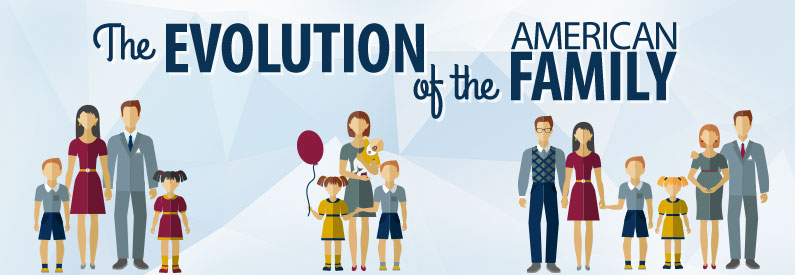Lesson 14: Marriage and Family
Attention

Click HERE to visit a really neat website about how family structure has changed over the decades.
Learning Outcomes
Upon completion of this lesson's material, students will be able to:
- Outline the different sociological perspectives on family.
- Reflect on how the media has provided diverse interpretations of the concept of family.
- Discuss the stage of your own family development.
Teaching
Marriage and Family
The relationship between marriage and family is an interested topic in Sociology.
Family is officially considered a "group"...so, many families have:
- Culture
- Social Structure
- Social Roles and Statuses
- Norms, Values, and Expectations
- Interact Frequently
- Interdependence
- Social Control
- Etc.
The structure of families varies considerably and the official definitions of family do not quite match the variability.
What sorts of family structures do you think exist:
- Step families
- Grandparents raising the kids
- Non-relatives raising the kids
- Mixed sexual orientation/race/gender, etc
Over time, families, like individual people, change. Consider Table 14.1 in the textbook:

How the family functions and interacts is significantly impacted by the stage of the family development.
Theoretical Perspectives on Family
Functional Perspective
Functions of the family:
- Stabilization of society
- Defining status and roles
- Educational support
- Socialization
- Economic support
Conflict Perspective
This perspective takes into consideration both the discussion of whose role is it to educate and prepare children for the world and a discussion on inequality among members of the family (including gender inequality).
Consider this:
- What if a family is not teaching "good" values to a child?
- What about home schooling vs. other options?
- Is there such thing as "women's work" and "man's work" in a family?
- As a primary socializing agent, what do families teach about all these issues?
Symbolic Interactionist Perspective
Family has deep personal symbolic meaning for many people.
- Core identity with family and kin
- Establish primary status and roles
- Status symbols
Post Modern Perspective
Technology has had a great impact on our view of family and on the ways in which families interact with one another.
Media Socialization of the Family
The media (television) has been portraying families since it's inception. Consider how these portrayals have changed. In what ways do you think the media has shaped public opinion about how families SHOULD be?
In modern times there has been a trend for television families to portray adults as selfish, immature, and incompetent (Two and a Half Men, Family Guy, Secret Life of the American Teenager). Even in cartoons, the lead characters seem to be the more intelligent and connected members of the family (Sophie the First)
Technology and Family Communication
This is an often cited issue with modern communication technology. People don't seem to talk anymore! Is this true?
Read this article: Is Technology creating a Family Divide?


Assessment

Lesson 14 Discussion A
Discuss examples and ideas about family from your own life that exemplify the different perspectives on family. Start off by only commenting on ONE perspective.
Lesson 14 Discussion B
Review the stages section in the Lesson and discuss where your family is in this process. Perhaps you belong to more than one family (your family of origin and now your own family). Reflect on how these families are at different developmental stages and how all of this impacts family status and roles.
Lesson 14 Quiz
- Reflect on how the media has portrayed families through the years. Pick two examples from television families and outline the differences between these two portrayals.